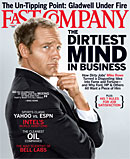Are Influencers Unimportant?
 We have all read Malcom Gladwell's The Tipping Point and latched on to the idea of spreading trends by reaching key influencers and leveraging their word-of-mouth to propel the brand we are marketing. We love this idea: spend the precious few marketing dollars that we have targeting only those people who will help us maximize those dollars by spreading the word of our products' greatness for us. Now, according to an article in this month's Fast Company, a network-theory scientist--Duncan Watts--is debunking the idea of influencers as a key marketing tool:"Watts believes...a trend's success depends not on the person who starts it, but on how susceptible the society is overall to the trend--not how persuasive the early adopter is, but whether everyone else is easily persuaded."While this may be true, even Watts' own research proves the effectiveness of influencers and word-of-mouth, evident by his experiment using new, unknown music. He recruited two groups of people for his study: one group ranked the music based on their own likes without knowledge of what other people thought, while another group--subdivided into eight "social groups"--ranked the music in an environment where they were able to see what others thought about that music. "In the merit group, the songs were ranked mostly equitably, with a small handful of songs drifting slightly lower or higher in popularity. But in the social worlds, as participants reacted to one another's opinions, huge waves took shape. A small, elite bunch of songs became enormously popular, rising above the pack, while another cluster fell into relative obscurity." However, "in each of the eight social worlds, the top songs--and the bottom ones--were completely different." Watts' analysis of these results: "Word of mouth and social contagion made big hits bigger. But they also made success more unpredictable."Inability to predict and see regularity in what was going to be popular in each of the groups does not debunk the role influencers play in starting trend; it actually proves their importance and influence. Each group was influenced by the influencers.While Watts' computer generated models of social behavior are impressive, they certainly aren't convincing when not tied back to real world examples . The Tipping Point is so convincing because the theory can be tied back to actual social and cultural events.
We have all read Malcom Gladwell's The Tipping Point and latched on to the idea of spreading trends by reaching key influencers and leveraging their word-of-mouth to propel the brand we are marketing. We love this idea: spend the precious few marketing dollars that we have targeting only those people who will help us maximize those dollars by spreading the word of our products' greatness for us. Now, according to an article in this month's Fast Company, a network-theory scientist--Duncan Watts--is debunking the idea of influencers as a key marketing tool:"Watts believes...a trend's success depends not on the person who starts it, but on how susceptible the society is overall to the trend--not how persuasive the early adopter is, but whether everyone else is easily persuaded."While this may be true, even Watts' own research proves the effectiveness of influencers and word-of-mouth, evident by his experiment using new, unknown music. He recruited two groups of people for his study: one group ranked the music based on their own likes without knowledge of what other people thought, while another group--subdivided into eight "social groups"--ranked the music in an environment where they were able to see what others thought about that music. "In the merit group, the songs were ranked mostly equitably, with a small handful of songs drifting slightly lower or higher in popularity. But in the social worlds, as participants reacted to one another's opinions, huge waves took shape. A small, elite bunch of songs became enormously popular, rising above the pack, while another cluster fell into relative obscurity." However, "in each of the eight social worlds, the top songs--and the bottom ones--were completely different." Watts' analysis of these results: "Word of mouth and social contagion made big hits bigger. But they also made success more unpredictable."Inability to predict and see regularity in what was going to be popular in each of the groups does not debunk the role influencers play in starting trend; it actually proves their importance and influence. Each group was influenced by the influencers.While Watts' computer generated models of social behavior are impressive, they certainly aren't convincing when not tied back to real world examples . The Tipping Point is so convincing because the theory can be tied back to actual social and cultural events.

